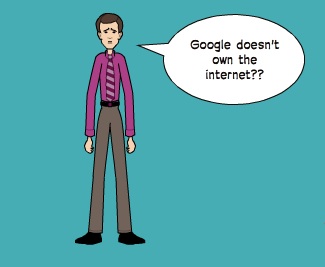How To Panic-Proof Your Link Campaign
All too often, I get a fair amount of frantic emails from people who are seeing a dropoff in rankings and/or traffic after the latest algorithmic update and are looking for help or just a second opinion. Sometimes a keyword that has been number 2 for 8 months in a row moves down a spot […]
All too often, I get a fair amount of frantic emails from people who are seeing a dropoff in rankings and/or traffic after the latest algorithmic update and are looking for help or just a second opinion.
Sometimes a keyword that has been number 2 for 8 months in a row moves down a spot to number 3. Sometimes one drops off the first page and isn’t in the top 100. Sometimes traffic almost completely dies. In any case, it creates panic.

Most people don’t think very clearly when they panic. Their immediate response is something drastic, their directives are to take place yesterday, and they start second-guessing everything else.
Now, I will panic about some things (no sea salt potato chips in the house, Netflix won’t work properly) but I don’t panic about rankings. Yes, a drop off can indicate a long-term problem that you need to fix, but in many cases, stopping what you’re doing or reversing direction can create even more problems down the road.
Look At Where Your Traffic Is Coming From
If you get very little traffic from Google and/or your Google rankings take a beating, making big changes can cause detrimental effects in those other sources. If you rank well for your money keywords in Bing and you’re getting good traffic and conversions there, making changes to keep up in Google could potentially hurt you.
Right after the Penguin update, my agency’s site was nowhere to be found in Google. We didn’t rank for our brand name (something that had never happened before) and other SEOs had this same problem.
Now, while I’ve done some potentially questionable stuff on behalf of clients, I have never done anything shady with our own site and it has a clean profile. I couldn’t find our site ranking for my name, my husband/partner’s name, or any of the terms that we used to rank for, at least not in the top 50 results.
You know how much traffic we lost? Very, very little. Most of our traffic comes from referral sites. I did nothing, waited it out, and we were back where we’d been, 48 hours later. I’m still not sure what happened.
Try To Stop Chasing The Algorithm
First of all, you’ll never catch it. Secondly, what makes you rank well in Google may not create more traffic or conversions. People don’t trust the first results in the same way that they used to anyway.
If you’re constantly changing strategy, how can you tell what’s going to work for you in the long run? Everyone went after money keywords and saw great rankings for awhile for those terms, then people started to focus on brand and URL keywords. We talked about how noise links were part of a natural profile.
Now, the rug has been pulled out from under all of us and even people who can’t figure out what they could have done wrong are suffering. People who know exactly what they’ve done wrong are cleaning up their messes and starting to capitalize on something else that they will eventually have to clean up.
Make Sure Your Site Provides A Good User Experience
Searchers want a quick and easy user experience on your site, and if you’re number 2 but your payment process is laborious and you suddenly reveal a massive shipping cost of $12.95 per item on the last step of the process, you’re probably not going to get as many conversions as you would if you were number 2, payment could be completed in 3 easy steps, and you revealed (on the homepage and the first page of the payment process) that shipping is free.
There’s a lot more to what’s going on with your site than simply ranking factors but many webmasters forget this when they panic.
Focus On Other Sources Of Traffic
As I have said before, it’s critical that we all diversify our sources of traffic. If you analyze your traffic and find that you are not getting much from your social media campaigns that you have in place, you need to get on the ball and maximize those.
If you’re in the position where your business would be crushed if you were penalized or deindexed in Google, you need to start making sure that you can be found through referral links on other sites (like through guest posting or writing a regular column for a site) and that people know your brand well enough that they can just type in the URL and get to you that way.
If your brand isn’t that well known, you need to focus on offline marketing so that it becomes more well known. Go speak at an event and give everyone your business card. You can’t continue to count on being in Google’s good graces even if you currently are.
Try Not To Wait Until Something Bad Happens
This is much easier said than done of course. If what you’ve done is working well right now, why mess with it? Even if the latest update hasn’t negatively impacted you, read all that you can about what it targets, and see where you stand. If you’re relying on 75% exact match anchors that are money keywords and you’re the only site left standing, you might want to consider switching it up before you get hit, too.
In the end, you can do everything the “right” way and still the algorithms will change. Some sites will not perform as well as they once did and accidents will happen. This is a game of art and science.
Know that if you haven’t yet suffered online, there’s always a potential risk, whether it’s a traffic loss, rankings loss, penalty, deindexing, etc. And, like they say in the financial industry, spread the risk. Hopefully you’ll panic less in the long run.
Contributing authors are invited to create content for Search Engine Land and are chosen for their expertise and contribution to the search community. Our contributors work under the oversight of the editorial staff and contributions are checked for quality and relevance to our readers. The opinions they express are their own.
Related stories
New on Search Engine Land
